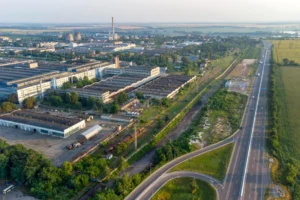Introduction:
Thailand’s economic landscape has undergone a remarkable transformation in recent years, with the government’s strategic focus on developing a diverse range of industries to help innovate and drive the country’s future growth. At the heart of this initiative are the S-curve industries, a carefully curated selection of sectors that hold immense potential for innovation, investment, and job creation. By targeting these industries, Thailand aims to position itself as a regional and global leader, utilising the power of technology, automation, and sustainable practices to drive its economy.
Key Points
- Thailand’s S-Curve industries are specifically selected sectors that will encourage innovation, investment, and job creation.
- The Board of Investment (BOI) offers attractive incentives for businesses in the S-Curve industries, including 100% foreign ownership, no foreign employee quotas, tax exemptions, and corporate income tax reductions up to 13 years.
- Industrial estates like the 304 Industrial Park are designed to support the growth of New S-Curve industries with modern infrastructure, advanced logistics, and eco-friendly features.
- By investing in these strategic sectors and specialised industrial zones, Thailand aims to solidify its position as a regional leader in cutting-edge industries and drive economic transformation.
What is the S-Curve Concept?
The term “S-curve” refers to the mathematical model that depicts the typical growth pattern of businesses and industries over time. This sigmoidal curve represents the surges and lulls in profitability and growth that companies experience as they navigate the natural cycles of the market.
When a new product or technology is introduced, it typically starts at the bottom of the S-curve, experiencing a slow but steady rise in adoption. As the innovation gains traction and becomes more widely accepted, the curve begins to steepen, reflecting a period of rapid growth. However, as the market matures and becomes saturated, the curve starts to level off, signalling a need for businesses to explore new avenues for growth.
What are Thailand’s S-Curve Industries?
Thailand’s S-curve industries are divided into two distinct stages:
- the First S-Curve
- the New S-Curve
The First S-Curve, introduced in 2014, consists of five key industries: smart electronics, agriculture and biotechnology, modern automotive, food processing, and affluent, medical, and wellness tourism. These sectors have already established a strong foothold in the Thai economy and have been the focus of significant investment and development.
As the First S-Curve industries continue to evolve, the government has identified five further industries to drive the country’s future growth.
The New S-Curve, introduced in 2018, includes robotics, aviation and logistics, digital, biofuels and biochemicals, and comprehensive healthcare. These sectors aim to take advantage of the latest technological advancements, and position Thailand as a hub for innovation and cutting-edge technology.
What are the First S-Curve Industries?
Smart Electronics
The electronics industry has always been a significant contributor to Thailand’s GDP, with multinational manufacturers like LG, Fujitsu, and Samsung establishing production facilities within the country.
The government’s focus on the smart electronics industry aims to build on this foundation, leveraging the well-established supporting industries. By embracing the latest advancements in IoT (Internet of Things) and smart device technology, Thailand is positioning itself as a regional leader in this sector.
Agriculture and Biotechnology
Thailand has a diverse natural ecosystem with over 15,000 plant species and a year-round growing season. Thailand has positioned itself a natural hub for biotechnology companies seeking natural resources. As the agricultural sector transitions to “smart farming” methods, Thailand’s highly developed research and development infrastructure provides a solid foundation for the growth of the biotechnology industry. By taking advantage of cutting-edge technologies and innovative practices, Thailand aims to enhance crop yields and drive sustainable agricultural development.
Modern Automotive
As the largest car manufacturer in the Asia-Pacific region, Thailand’s automotive industry plays an important role in the country’s economy, providing employment to around 850,000 people and contributing 10% of its GDP. However, with the rise of electric vehicles, and autonomous driving technologies, Thailand must enhance its technological capabilities to maintain its dominance in the industry. By investing in these emerging automotive innovations, the country can solidify its position as a regional manufacturing hub.
For more information about BOI incentives for the Electric Vehicles, please see here.
Food Processing
The food processing industry is one of Thailand’s most advanced and valuable sectors, contributing 23% to the country’s GDP. With a well-established infrastructure and a reputation for quality, the industry is poised to benefit from advancements in robotics and automation, which can improve efficiency, productivity, and product consistency.
Affluent, Medical, and Wellness Tourism
Thailand has long been recognized as a hub for medical tourism, attracting patients from around the world with its world-class healthcare facilities and skilled medical professionals. By integrating innovative technologies, such as surgical robotics, smart algorithms, telemedicine, and genetic data analysis, Thailand aims to further enhance its medical tourism offerings and solidify its position as a global destination for comprehensive healthcare solutions.
Please see here for more information about BOI promotions for the medical services here.
What are the New S-Curve Industries?
Robotics and Automation
As Thailand’s working population ages and a highly educated and skilled workforce, the country has recognized the need to invest in robotics and automation to maintain its position as a global leader in key industries. By integrating these technologies into sectors like healthcare, food processing, and automotive manufacturing, Thailand can address labour shortages, improve productivity, and enhance product quality.
For more information about BOI promotions for Robotics and Automation in Thailand, please see here.
Aviation and Logistics
The growth of Thailand’s tourism and export industries has increased the demand for maintenance, repair, and overhaul (MRO) services, as well as logistics support. By establishing Thailand as a hub for these services, the country can continue to attract the goods and people required for supporting the expansion of other S-curve industries.
Digital
The digital industry in Thailand is focused on developing innovative solutions in the areas of the Internet of Things (IoT) and Artificial Intelligence (AI). By fostering collaboration between established companies and startups, Thailand hopes to create an ecosystem that can provide cutting-edge technologies and services to support the growth of all the other S-curve industries.
Biofuels and Biochemicals
Thailand has been working hard to establish a complete Biofuels and Biochemical supply chain over the past two decades. Thailand’s rising demand for energy has aided in the development of this sector and the introduction of new technology. The government hopes to reduce energy costs and support the growth of other industries, such as agriculture and healthcare.
Comprehensive Healthcare
Integrating advanced technologies like surgical robotics, smart algorithms, telemedicine, and genetic data analysis into the healthcare sector can streamline medical procedures, enhance patient outcomes, and further strengthen Thailand’s position as a global hub for medical tourism.
What incentives are Available to Businesses Within the S Curve Industries?
The S Curve Industries form a key component of Thailand’s economic policy and plans for the future. Therefore, the government hopes to attract foreign investment as a way to encourage and support its development.
The BOI offers promotions for businesses who undertake activities in the aforementioned S Curve industries (as well as many others), however, in order to be eligible for these incentives, the following must be displayed.
Technology and Innovation
- Transfer of technology
- Research and development
- Active in the Targeted industries/services
- Value-added creation
- Upgrading of existing companies
Development of targeted areas
- Eastern Economic Corridor (EEC)
- Border Special Economic Zones
- Disadvantaged areas
Obtaining BOI certification provides the following benefits for investors:
100% Foreign Ownership: While regular Thai Limited companies are typically limited to 49.9% foreign ownership due to the Foreign Business Act, BOI-promoted companies face no such restriction, allowing complete foreign ownership.
Foreign Business Certificate: BOI-promoted firms receive a Foreign Business Certificate, exempting them from the 50+ restricted business categories under the Foreign Business Act. This opens up opportunities for a wider range of business activities in Thailand.
No Employee Quotas: Unlike other structures, BOI-promoted companies face no quotas when hiring foreign skilled employees. For example, Thai Limited Companies typically need a 4:1 ratio of Thai to foreign employees, but this requirement doesn’t apply to BOI-promoted businesses. Additionally, the process of obtaining visas for foreign employees is significantly more straightforward with BOI approval.
Potential Tax Incentives
The BOI offers the following tax incentives for companies who are granted a promotion. Please note that the exact incentives awarded (and their duration) depend on the final decision of the BOI.
• Exemption of import duties on machinery
• Exemption of import duties on raw or essential materials imported for export
• Exemption of import duties on goods imported for R&D
• Corporate income tax exemption up to 13 years
• 50% CIT reduction 5 years
The Role of Industrial Estates in Supporting S-Curve Industries
As Thailand’s S-curve industries continue to evolve, the country’s industrial estates play a key role in promoting their growth and development. These specialised zones are designed to cater to the specific needs of investors, offering a range of features and amenities that support the success of these cutting-edge sectors.
One such example is the 304 Industrial Park, which has positioned itself to attract investment from the New S-Curve industries. By incorporating modern production technologies, advanced logistics systems, and eco-friendly infrastructure, the park is well-equipped to meet the demands of businesses operating in the robotics, aviation, digital, and other emerging sectors.
The park’s strategic location, with proximity to automotive and electronics manufacturing hubs, as well as its connectivity to the Southern Economic Corridor (SEC), further increases its appeal to investors seeking to invest in Thailand.
Using the S Curve Industries to Drive Thailand’s Economic Transformation
The government’s focus on developing Thailand’s S-curve industries has already shown impressive results, with over 300 projects worth more than 131,580 million baht approved in the first half of 2022 alone. These investments are expected to contribute significantly to the country’s export income, helping to strengthen its overall economic performance.
As Thailand continues to invest in these strategic sectors, the development and expansion of the industrial estates will play a key role in attracting and supporting the growth of these cutting-edge industries. By providing the necessary infrastructure, resources, and a collaborative environment, these specialised zones will help drive Thailand’s economic transformation, solidifying its position as a leader in the Asia-Pacific region.
Our Thoughts
The Thai government’s focus on developing the S-Curve industries presents an opportunity for eligible businesses looking to establish a presence in Thailand. By prioritizing these sectors, Thailand is not only promoting innovation and technological advancement, but also providing a supportive ecosystem that incentivizes investment and facilitates the growth of cutting-edge industries.
Businesses within the S-Curve industries can benefit from the comprehensive range of incentives and support offered by the Thai government and the Board of Investment (BOI). From tax exemptions and corporate income tax reductions to streamlined processes for foreign ownership and hiring skilled foreign experts, these initiatives create an attractive environment for businesses to thrive.



